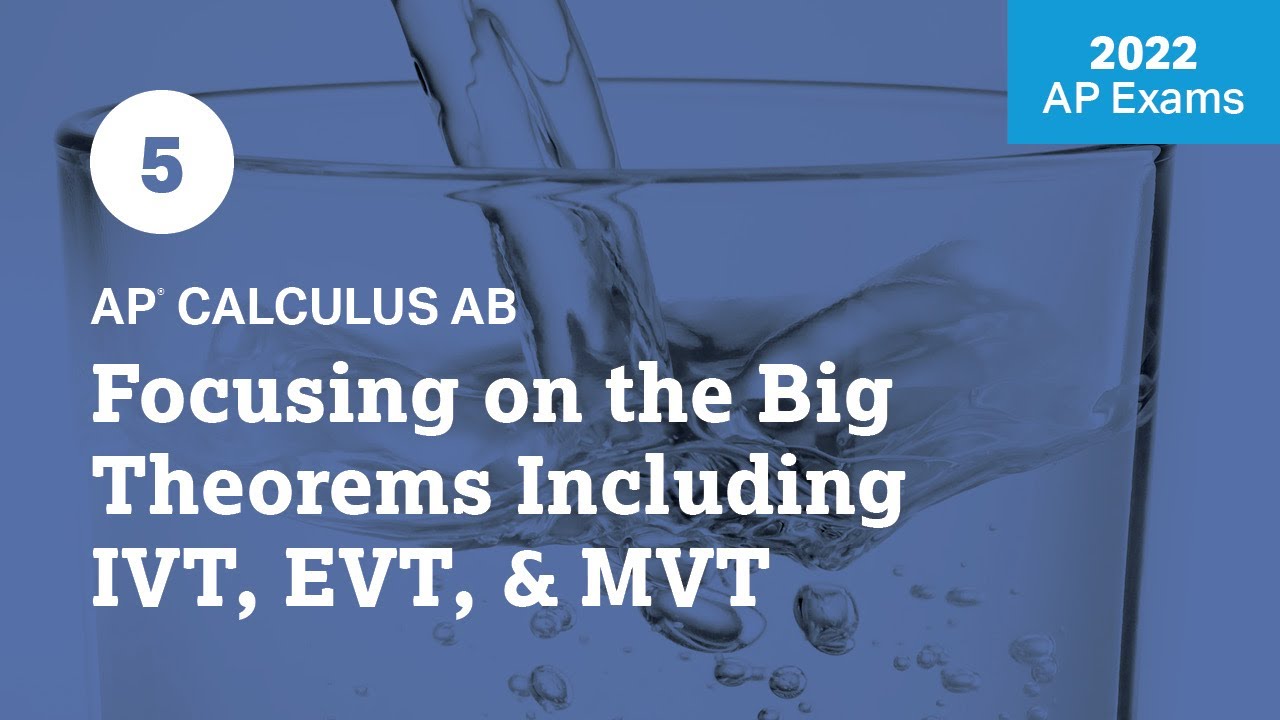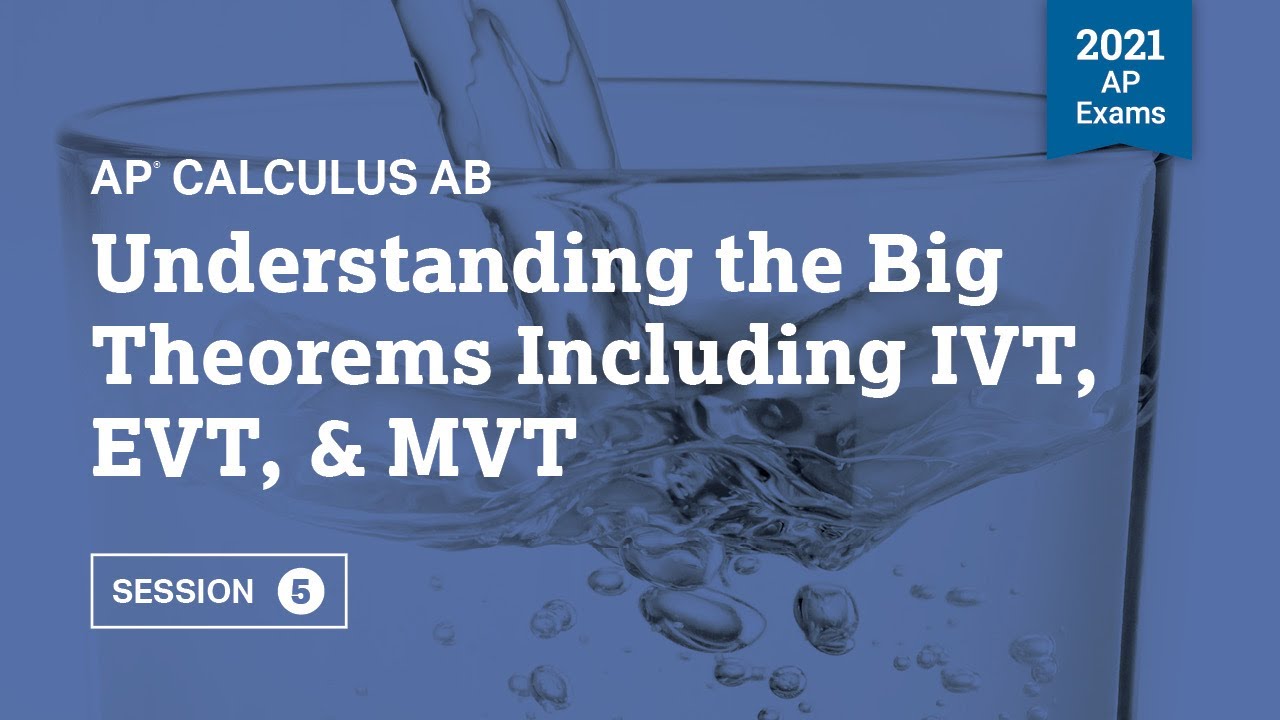2022 Live Review 8 | AP Calculus BC | Putting It All Together: Strategies & Tips for the AP Exam
TLDRIn this engaging and informative session, Brian and Tony, two passionate educators, share their final words of wisdom and tips for students preparing for the AP Calc BC exam. They emphasize the importance of writing explanations like a mathematician, using precise terminology and avoiding slang. The duo also highlights the significance of capturing easy points by focusing on well-understood concepts and avoiding common traps, such as rounding errors and ambiguous language. Additionally, they provide a detailed breakdown of key theorems like the Intermediate Value Theorem (IVT) and the Mean Value Theorem (MVT), offering strategic advice on tackling exam questions with confidence. The session concludes with heartfelt encouragement and a reminder that students' worth extends beyond exam scores, urging them to appreciate their efforts and their teachers' support throughout the journey.
Takeaways
- 📚 The session is the final one before the AP Calc BC exam, aiming to provide last-minute advice and tips.
- 🤓 The presenters, Brian and Tony, share personal anecdotes and experiences to connect with the audience.
- 🙌 They emphasize the importance of writing explanations as a mathematician would, using formal language and avoiding slang.
- 📈 The session includes a review of mathematical concepts, focusing on calculus and its applications.
- 🚫 The presenters discourage the use of abbreviations in exam answers to prevent misunderstandings.
- 🎯 Tips are provided on how to approach multiple-choice and free-response questions effectively.
- 📝 Importance of precision in language is stressed, especially when describing mathematical functions and their behaviors.
- 🤔 The session encourages students to think critically about their understanding of calculus concepts.
- 🌟 The presenters highlight the achievements of the students and the exclusivity of studying calculus BC.
- 📊 A practical example is given on how to use the derivative graph to determine local minima and maxima.
- 👀 The session ends with words of encouragement and a reminder of the hard work students have put into their studies.
Q & A
What is the main purpose of the video session discussed in the transcript?
-The main purpose of the video session is to provide final tips and wisdom to prepare students for their AP Calc BC exam, which is coming up in a few days.
What was the spontaneous activity attempted by the speakers during the session?
-The spontaneous activity attempted by the speakers was a virtual high five, which they had tried to do during their previous review videos but never successfully accomplished.
What is the significance of the 'talk the talk' tip mentioned in the video?
-The 'talk the talk' tip emphasizes the importance of using formal mathematical language and precise terminology when writing explanations on the AP Calc BC exam, as it demonstrates a deeper understanding of the concepts and can help students avoid losing points due to imprecise language.
How did Brian and Tony illustrate the concept of 'talk the talk' using a problem from the video?
-Brian and Tony illustrated the concept by discussing a problem that involved identifying a local minimum using the graph of the derivative function. They emphasized the need to explain the reasoning behind the answer using precise mathematical language.
What is the 'low hanging fruit' tip mentioned in the video?
-The 'low hanging fruit' tip advises students to focus on the easiest and quickest points they can earn on the exam first, rather than spending time on very difficult parts that may not yield many points even if solved correctly.
What is the significance of knowing basic formulas and theorems for the AP Calc BC exam?
-Knowing basic formulas and theorems is crucial as it ensures that students do not miss out on points due to forgetfulness. These fundamentals are tested throughout the exam and are essential for solving more complex problems.
How did the speakers demonstrate the application of the Intermediate Value Theorem (IVT) and Mean Value Theorem (MVT)?
-The speakers demonstrated the application of IVT and MVT by working through a free response problem involving a table of values for a function's derivative. They explained how to determine if there exists a value that meets certain conditions using these theorems and how to justify the answer mathematically.
What is the advice given by Brian and Tony regarding the handling of limits in the context of the exam?
-Brian and Tony advised students to handle limits by breaking apart the expression first to avoid nonsensical results like zero over zero. They suggested using l'Hopital's rule when encountering indeterminate forms and emphasized the importance of writing out the expressions clearly.
What is the 'UBU' principle discussed at the end of the video?
-The 'UBU' principle stands for 'You Been Upped', a phrase used by the speakers to encourage students to go into the exam with confidence, knowing that they have prepared well and are capable of performing their best. It's a reminder not to be defined by the exam score but to be proud of their efforts and growth.
What are some common traps and mistakes students should avoid during the AP Calc BC exam?
-Some common traps include not setting the calculator to the correct mode (radian), rounding numbers too early, and using ambiguous words in answers. Students should also avoid skipping steps and ensure they include correct units when asked for in contextual free response questions.
What advice does the transcript provide for students regarding their calculus teachers?
-The transcript encourages students to express their appreciation to their calculus teachers by writing a thank you note, acknowledging the hard work and support provided throughout their preparation for the AP Calc BC exam.
Outlines
🎓 Final Session and AP Calc BC Exam Preparation
In the final session, the speakers express their readiness to wrap up the series and share last bits of wisdom for the upcoming AP Calc BC exam. They emphasize the importance of capturing key insights to ensure the audience is well-prepared for the exam. The session includes a spontaneous high-five attempt, a humorous nod to past review videos, and a commitment to share more tips and tricks for exam success.
📚 Importance of Formal Writing in Mathematics
The speakers stress the importance of writing formally and using precise mathematical language when explaining concepts, especially in the context of the AP exam. They advise against using slang or abbreviations and emphasize the need to reference specific functions and behaviors accurately. The discussion also touches on the value of explaining mathematical concepts to non-experts as a test of understanding.
🤓 Tips for Tackling Difficult Exam Questions
The speakers provide strategies for dealing with challenging exam questions, such as focusing on the 'low hanging fruit' or easier points first. They advise against spending too much time on difficult parts that may not yield many points. The speakers also discuss the distribution of points across different question types and the importance of not underestimating seemingly simple questions.
📈 Understanding and Applying IVT and MVT Theorems
The speakers delve into the Intermediate Value Theorem (IVT) and the Mean Value Theorem (MVT), providing insights into their applications and the conditions under which they can be used. They discuss how to identify whether a question is asking about IVT or MVT based on the problem's wording and how to structure the explanation for these theorems during the exam.
🧠 Memorization and Application of Formulas and Theorems
The speakers emphasize the importance of memorizing formulas and theorems for success in the AP Calc BC exam. They provide an example of how to apply these concepts in a free-response problem, highlighting the need to show work and reasoning. The discussion includes strategies for handling questions about derivatives and conditions for various calculus concepts.
📝 Writing Clear and Accurate Limit Expressions
The speakers guide the audience through the process of writing limit expressions clearly and accurately. They discuss how to handle indeterminate forms and the use of L'Hopital's Rule. The speakers also provide a step-by-step breakdown of a limit problem, illustrating how to apply the rule and the importance of breaking apart fractions in limit expressions.
🚫 Avoiding Common Mistakes in Calculus
The speakers warn against common pitfalls in calculus problems, such as confusing function names, not rounding decimals properly, and not setting the calculator to the correct mode. They provide tips on how to avoid these errors, including being mindful of the information provided in the problem and ensuring accuracy in calculations.
🌟 You've Got This: Confidence and Perseverance
In the concluding segment, the speakers encourage the audience to approach the exam with confidence, built on months of preparation. They advise not to cram the night before, to find the 'low hanging fruit' in the exam, and to persevere even when faced with challenging questions. The speakers also remind the audience that their worth is not defined by their exam score and to appreciate the effort of their teachers.
Mindmap
Keywords
💡AP Calc BC Exam
💡Session Eight
💡Tips and Tricks
💡Concavity
💡Differentiability
💡Exam Strategies
💡Producer John
💡High Five
💡Loose Cannon
💡Contextual Free Response
💡Fundamental Theorem of Calculus
Highlights
The session is the eighth and final one, aiming to prepare students for their upcoming AP Calc BC exam.
Instructor Brian shares a personal anecdote about trying to high-five virtually with a colleague during the pandemic, highlighting the challenges of online teaching.
The importance of using formal mathematical language and avoiding slang terms when writing explanations on the AP exam is emphasized.
Students are advised to avoid using abbreviations in their exam responses to prevent misinterpretation and potential loss of points.
Instructor Tony stresses the value of listening to teachers and the importance of their guidance in preparing for the AP exam.
The concept of 'talk the talk' is introduced, which encourages students to write explanations as a mathematician would, using precise terminology.
An example is provided to illustrate the importance of precise language when explaining calculus concepts, such as local minimums.
Instructor Brian emphasizes the need for precision in exam responses, as vague language can lead to incorrect interpretations.
The transcript includes a detailed explanation of how to apply the Intermediate Value Theorem (IVT) in problem-solving.
The Mean Value Theorem (MVT) is discussed, with an emphasis on understanding the conditions for its application.
Instructors Brian and Tony provide advice on how to approach multiple-choice questions on the AP exam, focusing on grabbing 'low hanging fruit' or easy points first.
The concept of 'know your basic formulas and theorems' is highlighted as crucial for avoiding unnecessary points loss.
Instructor Tony shares a strategy for tackling limit problems, emphasizing the importance of breaking apart fractions to avoid indeterminate forms.
The session concludes with motivational advice, encouraging students to be confident in their preparation and to approach the exam with a positive mindset.
Instructor Brian provides a humorous anecdote to illustrate the importance of precision in mathematical language, using the example of explaining concepts to a non-mathematician.
The transcript includes a discussion on the importance of understanding the context of problems and avoiding common mistakes made by students.
Instructor Tony emphasizes the need for students to trust in their abilities and the work they've put into preparing for the exam.
Transcripts
Browse More Related Video

2022 Live Review 5 | AP Calculus AB | Focusing on the Big Theorems Including IVT, EVT, & MVT

2021 Live Review 8 | AP Calculus BC | Putting It All Together: Strategies & Tips for the AP Exam

8 | FRQ (No Calculator) | Practice Sessions | AP Calculus AB

Monday Night Calculus: Reviewing for the AP exam

2021 Live Review 5 | AP Calculus AB | Understanding the Big Theorems Including IVT, EVT, & MVT

🚨EXPERT 🚨Tips for How to Get a 💥5 on the 2022 AP Calculus AB Exam💥 [What You REALLY Need to Know]
5.0 / 5 (0 votes)
Thanks for rating: